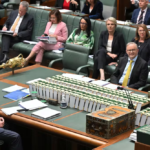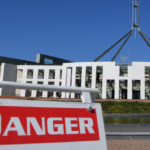The great obfuscation: Australia votes YES whilst bigotry is rebranded as “freedom of speech”

Today marks a meaningful moment in the history of Australia, as the country votes overwhelmingly in favour of same sex attracted citizens having access to the same right to marry as all other citizens.
Oxford Street is alive with the irresistible satisfaction at having achieved success in the face of adversity. Yet, as celebrations get underway, it is difficult to ignore the bitter irony embedded in a campaign for equal rights that has simultaneously facilitated the re-branding of bigotry as “freedom of speech”.
Indeed, the introduction of Liberal Senator James Paterson’s rival marriage equality bill serves as a poignant reminder that the 122 million dollar public opinion survey had little, if anything, to do with civil rights, and everything to do with controlling what the accepted form of “equality” would look like post vote.
The conservative factions of the Liberal Party have been well-aware that the public would, as with most all other Western democracies, vote in support of marriage equality. The task for conservative Liberals has, and will continue to be, how to ensure that equality can be repackaged as a “value” we are not expected to hold. The use of “marriage” as a prefix to “equality” has facilitated this re-branding. As Paterson has cunningly asserted, it is not that conservatives oppose “equality”, but rather “marriage equality” – apparently an entirely different concept.
We are being quietly persuaded to allow conservative opponents to speak about equality as a “value” that is being “imposed” upon those who do not agree with it. We are somehow being encouraged to accept a framing that claims same sex attraction is a lifestyle choice – a decision in which each individual is able to make a “value” judgment. We are being gently called to heal by this subtle reframing, and it will come to shape the cultural undertone of Australian attitudes toward the LQBTQI community in generations to come.
The evidence is hidden within the semantic acrobatics being deployed around the use of the phrase “freedom of speech”. We must ask ourselves: have we really won a meaningful seat at the civil rights table, or are we being tossed a bone to momentarily distract us whilst the choke chain is slipped around our necks?
It would be a mistake to underestimate the power the church has over what will be the accepted form of marriage. It would be equally erroneous to underestimate the political significance this control over the acceptable forms of marriage has for an economy that is structured around the heterosexual nuclear family. Indeed, the modern economy depends on the majority of citizens conforming to a traditional household structure, with a dominant masculine head of household, and a subordinate female unpaid domestic labourer. This is a system that requires the majority of domestic labour to be unpaid in order for the modern economy to function, and lionising heterosexual masculinity as the appropriate form of leadership in the household normalises the idea the narrative that claims male dominance as “natural”.
The structure and form of marriage, the family, and the household is not a system built around “values”. It is a system structured to allow conservative governments and religious institutions to bind and control through the maintenance of a hierarchy of authority that privileges them.
It should be no surprise to us that Tony Abbott, the architect of the plebiscite, once remarked “What the housewives of Australia need to understand, as they do the ironing, is that if they get it done commercially it’s going to go up in price.” In his characteristic way Tony Abbott was not referring to the price of commercial laundry. He was voicing a common conservative anxiety that the recognition of the real cost of unpaid domestic labour has the potential to destabilise the global economy. This is an anxiety that resonates throughout the western world, and this is the anxiety which drives disputes on women’s role within the family unit in both political and religious debate. It is this same anxiety that drives opposition to same sex marriage.
Arguing whether same sex attracted people should be given the same rights as everyone else, or whether they should be denied the rights to which all others consider themselves entitled, is not a question of “values”. It is primarily a question of economics, and consequently it is a question of power. It is a question of what form of family we will allow to become normalised, and what hierarchical structure it will reflect.
The outrage elicited by the mere suggestion that family may not reflect the normalised patriarchal form is abhorrent not because it is amoral, but rather because it fundamentally undermines the accepted hierarchy of masculine power. The Church will not surrender their control over the definition of marriage without a fight, and neither will the state. There is simply too much power at stake, and it is power that rests on a long history of the violent subordination of women within the household.
In the coming weeks it would be a mistake to assume that this battle is solely one of LGBTQI rights. It is, by extension, just as much about the issue of gender inequality, and the jockeying for control over the hierarchies that will govern what the acceptable form of “family” will be.
But today we celebrate, and celebrate we must, as equality has emerged victorious from a brutal and bloody battle in which a marginal community has suffered incalculable damage under the onslaught of deeply entrenched Australian homophobia. But as we come together to celebrate we do so in a world where the very concept of equality itself is being undermined by a retelling of the story of constitutional freedom.
We are being cunningly coerced into accepting that to demand someone be able to defend their argument is an attack on their right to hold any argument at all. We are being quietly conditioned to accept that a person is “entitled” to an opinion, no matter its flawed logic, or its fundamentally obstinate position of prejudice and intolerance. However when the revelries subside, we must ask ourselves what precisely it is that we’ve won.
Tenley is currently engaged in ongoing research at the University of Sydney focussed on the anthropology of gender, and the political economy of gender classifications in international development discourse.













Alan Douglas
November 19, 2017 at 4:59 pm
It appears to be accepted that world-wide, a significant percentage of people are born with an attraction to the same sex. Whether this means that they are born with the wrong gender or otherwise is immaterial – they are what they are and I, for one do not feel that I have a right to judge or condem them. If they can get some satisfaction from a relationship without hurting anyone else, does it really matter to us? I would imagine that overall, their lives would not be as happy as ours and this could be one reason that they tend to gather in large groups and act a bit ‘over the top’ from my perspective. But so what? I feel that those to talk about knowing what God wants, what God thinks or what God says are showing a degree arrogance bordering on hypocrisy.